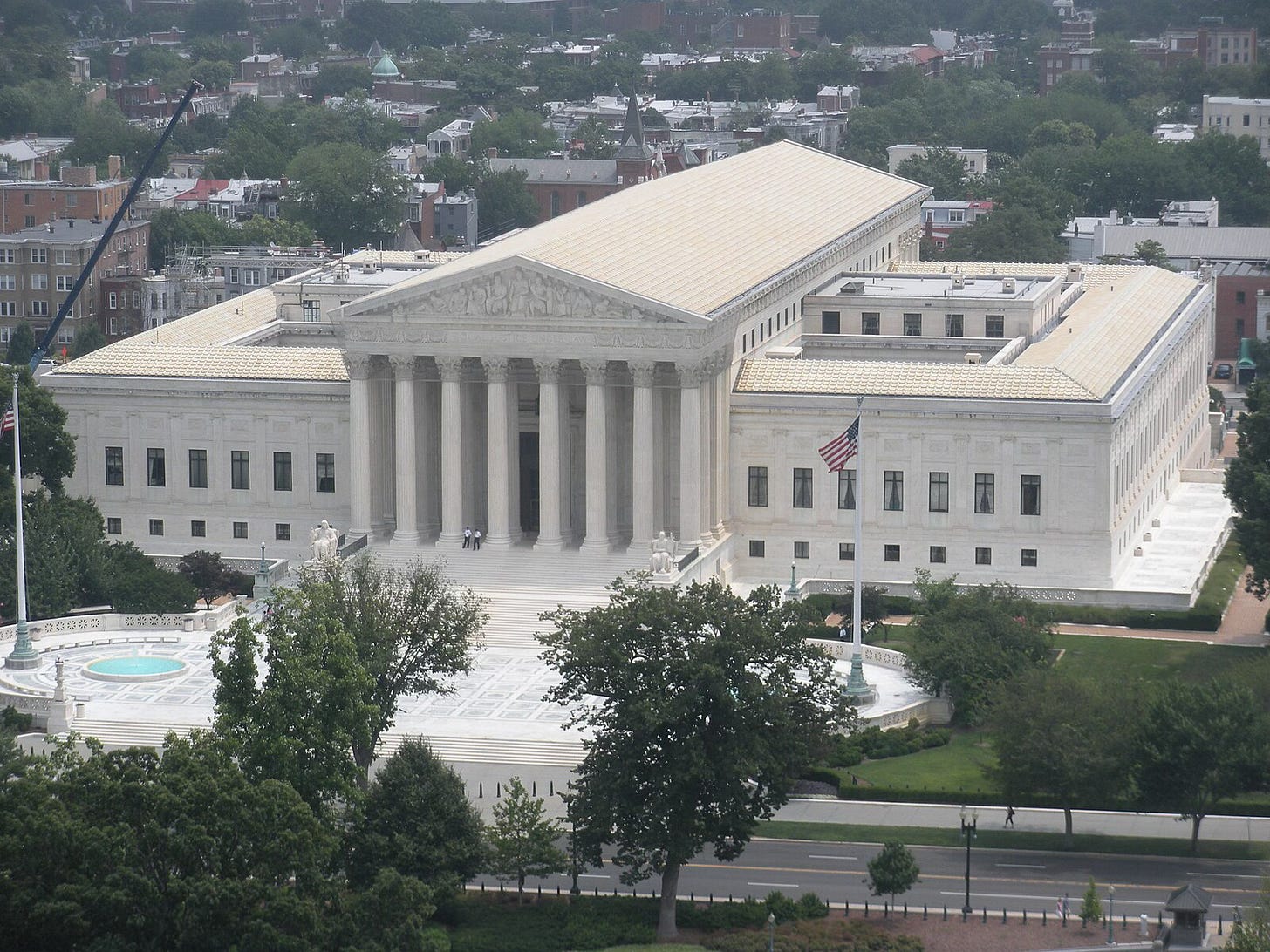Supreme Court Takes Up Tough Question: Do Trans Kids, Equal Protection, Exist?
Just your average potential armageddon.

Would you believe that trans rights are about to be enshrined in the Constitution? (No, I’m not talking about the proposed constitutional amendment in the state of Oregon. That’s a whole ’nother story.)
Well then, would you believe you can get any bra half off with the purchase of one bra at full price at Lane Bryant?
One of these, I am told, is national news today, and the other is not, so let’s dive in and cover … :checks notes: … the whole Constitution thing.
I’m not one to blow smoke up your vaginoplasty, so let’s tell this story straight up: Yesterday the Supreme Court of the United States granted certiorari for — meaning that they agreed to review — a Sixth Circuit Court of Appeal case out of Tennessee. They will be deciding if trans children have a right to access the same drugs and medical interventions as other children or if laws targeting trans people as trans people are presumptively legal. (The Sixth Circuit said target away, but other circuits have said otherwise.) But because of a technical detail in how the case came to the court, we already know that the decision will turn on the 14th Amendment’s Equal Protection clause, and how that is interpreted has the potential to affect everyone, cis and trans.
The original case was L. W. v. Skrmetti, a suit filed by three trans children, their parents, and one Tennessee doctor who treats trans children. The newly minted Supreme Court case is US v. Skrmetti, with the Department of Justice appealing on behalf of the families after Merrick Garland determined the case was in the general public interest.
It seems the Supreme Court tried hard not to grant the appeal at all before relenting and accepting the petition of the DOJ but not the parents. Scotusblog reports that they only accepted the case after including it in cert review meetings six separate times. But however it got there, it’s on the calendar now, and people are asking, “So what does this mean?”
So what does this mean?
First it means that SCOTUS is going to take a good hard look at “equal protection” in the context of gender broadly and trans people specifically. That is scary. Despite a positive ruling for trans employees in Bostock v. Clayton County, a case about the meaning of a particular statute that mentions sex explicitly, Dobbs doesn’t give anyone confidence in this court’s willingness to protect US citizens against sex or gender discrimination on the basis of equal protection when that clause of the 14th Amendment does not mention sex or gender specifically. (Neil Gorsuch, pivotal positive vote in Bostock, was hard core for banning abortion when the question became constitutional in Dobbs.)
And make no mistake, equal protection is under serious threat. The Sixth Circuit found that banning trans care doesn’t constitute discrimination based on sex because every teenager, no matter their birth sex, is denied access to trans-related medical care. It’s the Loving v. Virginia ploy: “It’s not race discrmination if we criminalize whites and Blacks equally for marrying out of their race!”
Meanwhile, the Sixth was terribly concerned about equal protection ... of state legislatures. If citizens had a right to their own care, then states that banned trans health care would be less equal than states that protected access to that same care:
[S]ound government usually benefits from more rather than less debate, more rather than less input, more rather than less consideration of fair-minded policy approaches. To permit legislatures on one side of the debate to have their say while silencing legislatures on the other side of the debate under the Constitution does not further these goals.
No, really, they said that.
The Sixth then added in a bit of CANCEL CULTURE! since that always goes over well at the country club:
Prohibiting citizens and legislatures from offering their perspectives on high-stakes medical policies, in which compassion for the child points in both directions, is not something life-tenured federal judges should do without a clear warrant in the Constitution.
To put it mildly, legislators would still be able to “offer their perspectives” even if trans kids have a right to care. Abortion access was a constitutional right for almost my entire life and the Right never would shut up about it. The question isn’t about the right of a rando legislator/street preacher to yell at me for embracing Satan. The question is whether the legislator/street preacher can call 911 to arrest my doctor before they write me a prescription.
Because this case will turn on the Constitution and not only one particular law, as Erin in the Morning said:
the eventual ruling could have far-reaching impacts on transgender people across the United States; a ruling from this case could potentially be applied to many other laws targeting transgender individuals as well.
That story also has some good analysis of two important precedents that might have significant impacts in how the Supreme Court rules (go read it!), but the TL/DR is that the Court might just maybe decide to fixate on how there was not a history and tradition of dispensing puberty blockers in the court of James the First. For various reasons, including concerns about traumatic head/desk injuries throughout academia, this history and tradition approach is bigly scary to trans people and others.
Yr Wonkette, however, would add that if the feared emphasis on history and tradition materializes in this case as it did in the Second Amendment case New York State Rifle and Pistol Association v Bruen, as well as in Dobbs, that change in how equal protection operates will determine the fates of many cases unrelated to trans people and trans rights. And while this has induced a bit of doomsaying around the internet, it’s also important to note that the Court is already backing off the history and tradition standard in Second Amendment cases because it’s making them look like idiots if they have to stand by it.
So will the Supreme Court endorse the hostile (and frankly insane) vision of the Sixth Circuit that the 14th Amendment clause protects all state legislatures born or naturalized in the United States, but no trans kids? Will they endorse their own precedents by employing the reasoning of Bostock to find trans people protected by the Equal Protection clause where their own decisions have referenced sex and gender?
Signs Cloudy! Ask again later!
We could be heading for a future in which requiring women to wear either burkas or bikinis is very legal, very cool so long as you also require men to wear business attire. Everyone has a dress code! No discrimination!
But we could also be headed for a sane and rational application of the 14th. It’s all going to come down to how Gorsuch is feeling and whether his textualist pedantics over the word “sex” in Title VII transfers over to the Constitution. That makes me feel very secure, I can tell you!
PREVIOUSLY!
Your friendly, neighbourhood Crip Dyke also writes other perverted stuff!





So, interesting factoid that couldn't make it into a law 'splainer, but when I was reading around getting ready to write this piece, I kept coming across variations of the same basic phrase, "Supreme Court wades into the transgender culture war."
It made me wonder, who the fuck came up with "wading" into war? That's a good couple of metaphors thrown in the Osterizer.
as the parent of a trans kid, this is beyond frightening. at least she’s no longer a minor but my parental worries are not eased because 1) we live in a shitty red state with a 22-year GOP supermajority and 2) insane judiciary such as the 6th Circuit.